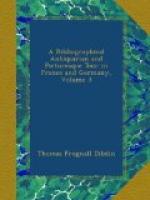Notwithstanding I had made every enquiry among the principal booksellers, of Antiquars, [178] for rare and curious old volumes, I literally found nothing worth purchasing. The Baron Derschau was doubtless my best friend on this score. Yet I was told that, if I would put a pair of horses to my carriage, and drive, to Furth—a short two German mile stage from Nuremberg, and which indeed I had distinctly seen from the windows of the citadel—I should find there, at a certain Antiquar’s, called HEERDEGEN, an endless, variety of what was precious and curious in the department of which I was in search. Accordingly, I put the wheels of my carriage in motion, within twenty-four hours of receiving the intelligence. The road to Furth is raised from the level of the surrounding country, and well paved in the centre. It is also lined by poplar trees, a great part of the way. I have reason to remember this visit for many a long day. Having drove to M. Heerdegen’s door, I was received with sufficient courtesy; and was told to mount to the top of the house, where the more ancient books were kept, while he, M. Heerdegen, settled a little business below. That business consisted in selling so many old folios, by the pound weight, in great wooden scales;—the vendor, all the time, keeping up a cheerful and incessant conversation. The very sight of this transaction was sufficient to produce an hysterical affection—and, instead of mounting upwards, I stood—stock still—wondering at such an act of barbarity! Having requested permission to open the volumes in question, and finding them to contain decretals, and glosses upon councils, I recovered myself by degrees ... and leisurely walked to the very topmost floor of the house.
M. Heerdegen was not long after me. He is a most naif character; and when he is pleased with a customer, he presents him with an india ink drawing of his own portrait. On receiving this testimony of his approbation, I did not fail to make my proper acknowledgements: but, with respect to the books with which I was to load my carriage, there was scarcely a shadow of hope, of even securing a dozen volumes worth transporting to the banks of the Rhine. However, after three hours pretty severe labour—having opened and rejected I know not how many books of Medicine, Civil and Canon Law, Scholastic Divinity, Commentaries upon Aristotle, and disputations connected with Duns Scotus, together with a great number of later impressions of the Latin Bible in the XVth century—I contrived to get a good Latin Plutarch, some pretty Aldine octavos, a few Lochers and Brandts, a rare little German poetical tract, of four leaves, called the Wittemberg Nightingale, and an Italian Bible printed by the Giuntae, which had belonged to Melancthon, and contained his autograph:—all which, with some pieces by Eckius, Schottus, and Erasmus, to the amount of 4_l._ 4_s._ of English money, were conveyed with great pomp and ceremony below.




